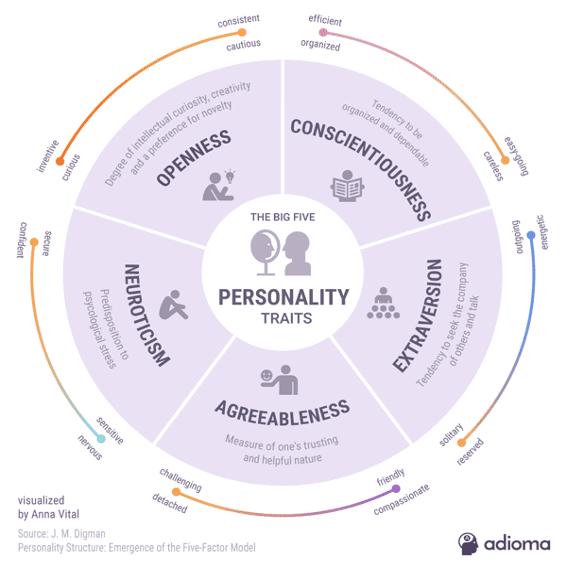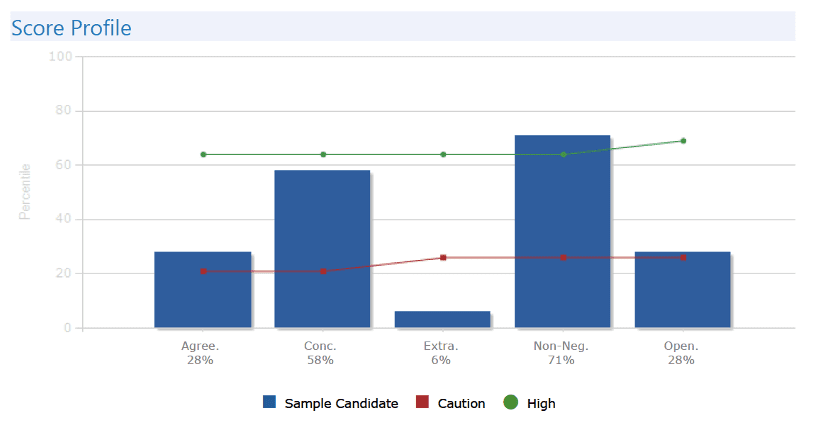The Importance of ‘Trust’ in Teams that Work Remotely
Introduction
With numerous companies around the world being forced to implement ‘remote working’ I thought it would be useful to look at the relationship between personality, trust and remote working. Probably the most well-known model of personality is the Big 5. The Big 5 focuses on 5 core personality dimensions.
The Big 5
Unpacking the Big 5
Dr Edwin van Thiel (2020) describes the Big 5 in the following way:
- Openness – People who like to learn new things and enjoy new experiences usually score high in openness. Openness includes traits like being insightful and imaginative and having a wide variety of interests.
- Conscientiousness – People that have a high degree of conscientiousness are reliable and prompt. Traits include being organized, methodical, and thorough.
- Extraversion – Extraverts get their energy from interacting with others, while introverts get their energy from within themselves. Extraversion includes the traits of energetic, talkative, and assertive.
- Agreeableness – These individuals are friendly, cooperative, and compassionate. People with low agreeableness may be more distant. Traits include being kind, affectionate, and sympathetic.
- Neuroticism – Neuroticism is also sometimes called Emotional Stability. This dimension relates to one’s emotional stability and degree of negative emotions. People that score high on neuroticism often experience emotional instability and negative emotions. Traits include being moody and tense.
Building Trust within Remote Teams
Research reveals that one way in which the Big 5 is related to remote team performance is through the contribution that the dimensions of Conscientiousness, Agreeableness and Extraversion make towards the development of ‘trust’ within the team. People who are high on these dimensions are more able to create trusting relationships and thereby a climate of trust because they are:
- Reliable, methodical and organised
- Cooperative, kind and understanding
- Energetic, outgoing and open
Why is Trust so Important in Remote Teams?
‘Trust’ is imperative in enhancing performance in remote teams because when working remotely you cannot directly observe or monitor what team members are doing. You have to trust and empower one another to make the contribution and value add that is required. When team members feel trusted to execute their work effectively and use their judgement accordingly, they are more likely to experience ‘flow’, take accountability, be disciplined and perform.
Conversely, when a remote team is made of team members who do not trust each other the tendency is to want to check or micromanage the work of others, which in a remote team is very hard to do, and ultimately detracts from delivery and performance. A climate of distrust is created, which hinders optimal performance.
Big 5 elements that contribute to trust in teams
Whilst there are numerous personality assessment tools one could use to assess the Big 5 personality characteristics, at Bioss SA we make use of the following:
Below are some graphic representations of how each of these tools display the Big 5:
LPA Big 5
OCEAN Big 5
Conclusion
As a result of current events remote working is being enforced en masse. This creates a new challenge for many companies and their employees. Whilst there are many variables that will influence the success of a remote working team,” trust” is one aspect to consider. If ‘trust’ is something you wish to foster and develop, it may be useful to determine the extent to which team members display the characteristics of Agreeableness, Extraversion, and Openness, as well as the extent to which behaviour change may be required. A team which generally does not display these characteristics may experience difficulties in forming trusting remote relationships.
It is important to note that a team that displays all these characteristics does not guarantee success and a different blend of personalities could also have positive outcomes for remote working. Nevertheless, it is important for organisations, managers and teams to start thinking differently about how to ensure remote team success. Considering team dynamics via the assessment of the Big 5 as it relates to trust may be both a useful, informative and cost-effective place to start!
For more information email info@bioss.com.
References
- https://www.123test.com/big-five-personality-theory/
- Managing the Agile Workforce – Chapter 4: The Role of Personality. (Karen Plum)
Recent Posts
- Why are Psychometric Assessments beneficial?
- How to Use Psychometric Assessments in Making Selection Decisions
- Are Managerial Development and Leadership Development Programmes the same thing?
- Human Potential: The Differential of the Themes of Work Framework
- Navigating the Future of Work: Balancing Job Automation and Job Autonomy
Categories
- 360 Leadership Survey
- Assessment
- Capability
- Career Path Appreciation (CPA)
- Change Management
- Coaching
- Consulting
- Employee Engagement
- Flow and Engagement
- Leadership
- Marketing
- Neuroscience
- Organisational Design
- Performance Management
- Personal Development Analysis (PDA)
- Personality
- Strategy
- Structural and Talent Analytics
- Systems
- Talent Management
- Training




